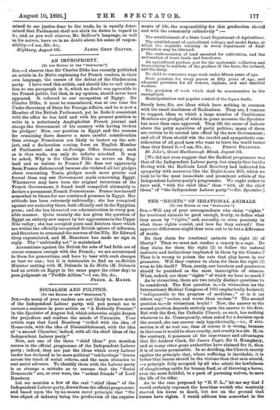AN IMPROPRIETY.
[To THE EDITOR OF THE " Siszclicroa."] SIR,—I observe that Sir Charles Dilke has recently published an article in Le Malin explaining for French readers, in their own language, the causes of the defeat of the Gladstonian party. I have read this article, and should like to call atten- tion to one paragraph in it, which no doubt was agreeable to the French public, but that, in my opinion, should never have appeared. It referred to our occupation of Egypt. Sir Charles Dilke, it must be remembered, was at one time the Under-Secretary of State for Foreign Affairs, and he is now a Member of the British Parliament, yet he finds it consistent with the office he has held and with his present position to write in a notoriously Anglophobist French journal and charge the Government of his country with having broken its pledges ! Now, our position in Egypt and the reasons for remaining there deserve a more careful consideration than average Frenchmen are likely to bestow on the sub- ject, and a declaration coming from an English Member of Parliament and an ex-Foreign Office Secretary, such as is thus made, can only do infinite mischief. It may be asked, Why is Sir Charles Dilke so severe on Eng. land and so lenient to France ? He does not apparently deem France dishonoured because she violated all her pledges about evacuating Tunis, pledges much more precise and formal than any our Government made concerning Egypt. Whatsoever may have been the original intentions of the French Government, it found itself compelled ultimately to declare a permanent French Protectorate. France has herself somewhat to blame for our continued presence in Egypt. Her attitude has been extremely unfriendly ; she has conspired against our authority there, both officially and in the Egyptian press ; and she has thwarted our administration in every pos- sible manner. Quite recently she has given the question of Egypt an entirely new aspect by her aggressions in the Upper Nile valley ; she has occupied posts and districts there which are within the officially recognised British sphere of influence, and threatens to command the sources of the Nile. Sir Edward Grey expostulated, and M. Hanotaux has made no sign in reply. The "unfriendly act" is maintained.
Accusations against the British for acts of bad faith are of course common enough with the French ; we are accustomed to them for generations, and have to bear with such charges as best we can ; but it is intolerable to find an ex-British Minister uniting with M. Deloncle in Le Matin (M. Deloncle had an article on Egypt in the same paper the other day) to pass judgment on "Perfide Albion."—I am, Sir, &c., FREER. A. MAxsE.


































 Previous page
Previous page